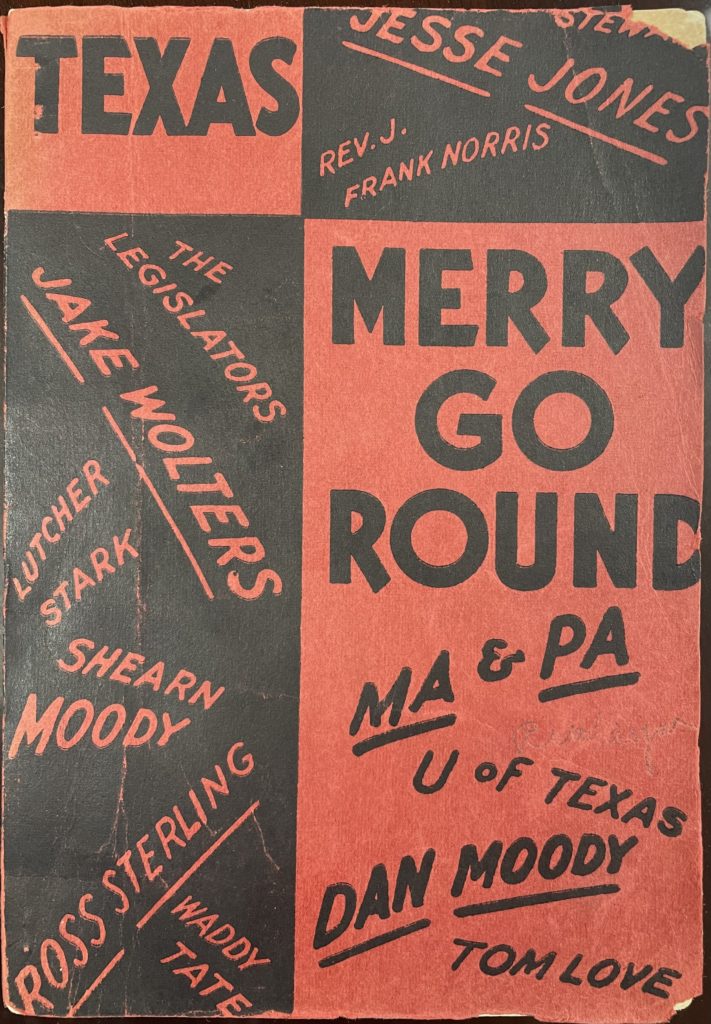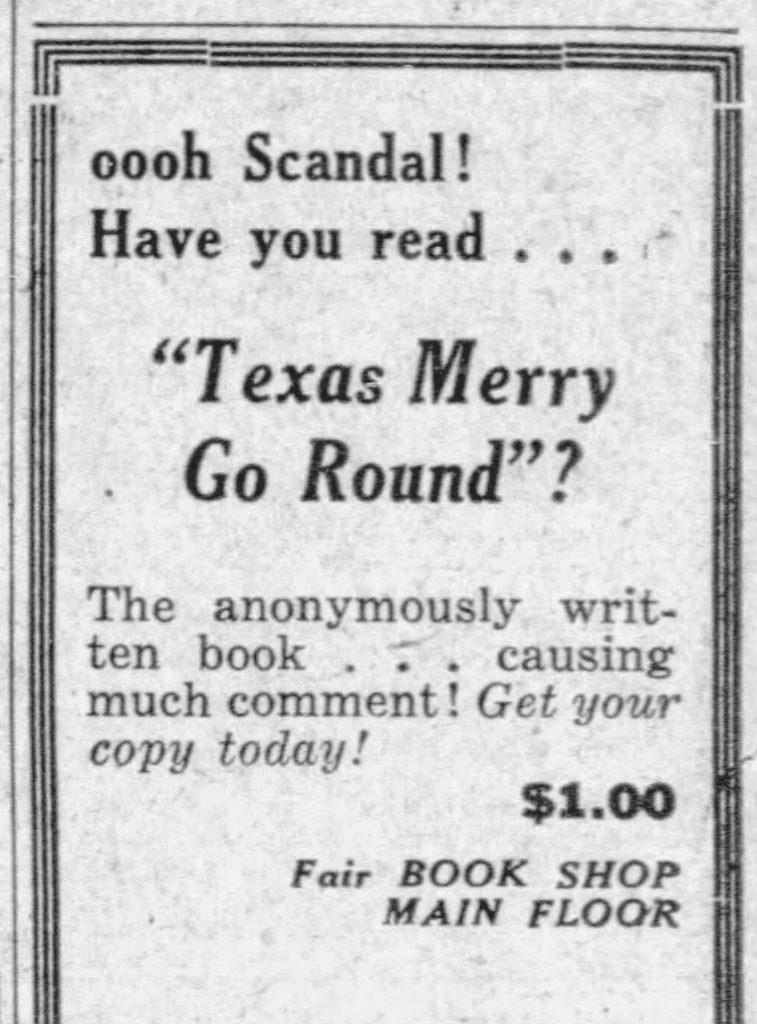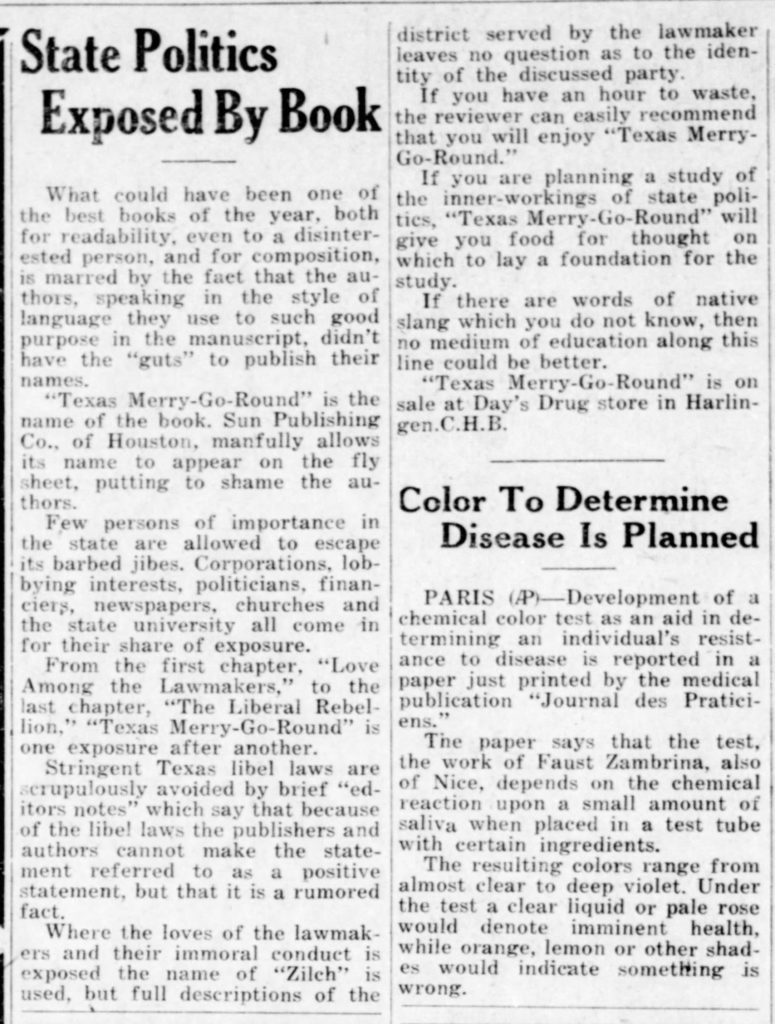The following article is taken from a 1933 paperback titled “Texas Merry Go Round”. The authors were not named as they took many swipes at famous Texans of the time. One chapter is devoted to J. Frank Norris. I present it here as an example of anti-Norris sentiment. – MBG

SAVIOUR OF SOULS
Fort Worth is doubly distinguished in Texas for the scent of its packing house abattoirs and for the Rev. J. Frank Norris. Though fourth in size among Lone Star cities it ranks first in rusticity, which explains Norris and partly explains the packing house bequest.
The stench of dead cattle was almost born with the town, for ever since Fort Worth has been on the map there have been packing houses. But J. Frank Norris was acquired from Dallas, and – whatever the Chamber of Commerce may think about it – he has carried the name of the city further than the aroma of Swift and Armour.
Today he is the most famous of Texans save only Jim Ferguson and probably the most hated, save only Jim. His congregation is the largest in the Southwest yet he is barred from the annual councils of his denomination, the Baptist. He has faced juries in arson and murder and yet he is the most persistent foe of commercialized vice among all the evangelical ministers with whom Texas is afflicted.
More than 10,200 persons are enrolled candidates for salvation under the banner of Norris. His First Baptist Church is generally conceded to be the largest Fundamentalist temple of worship in North America; and for horse play and cash profits is probably second only to the holy racket which Aimee Semple McPherson Hutton runs for Iowa farmers and movie-struck shop girls in Los Angeles.
The Reverend Dr. Norris was born in Dadeville, Alabama, in 1877 and came to Texas when he was eleven years old. He started preaching when scarcely sixteen; and his first crusade was against the liquor industry, which he claimed, was endeavoring to enslave his father.
Baylor University conferred a degree on Norris in 1903. The late Dr. Samuel Palmer Brooks, then president of Baylor, little dreamed that this fledgling would twenty years later arise to denounce his Alma Mater as a stronghold of atheism.
While he was still a student, J. Frank got a chance to practice on the Baptist communicants at Mount Calm, Texas. After receiving a Ph. M. from the Southern Baptist Theological Society of Louisville, Kentucky, in 1905, the young pastor was called to the rich and fashionable McKinney Avenue church in Dallas.
Three years at McKinney Avenue in the service of wealthy brethren added much to Norris’ mounting reputation. At that time he was in full accord with the tenets of the Baptist Church. He was even made the editor of the BAPTIST STANDARD.
When Norris went to the First Baptist Church, there were only thirteen paying customers. But Fort Worth was like a frontier town; and if his early audiences were small, opportunity for crusading was unbounded. Wicked old Calhoun Street, the Hell’s Half Acre of Cowtown, felt his lash and fire. He implored tears for the wives of men who spent their half dollars in saloons.
He frequently charged that the devil was attempting to destroy him and his church. The populace awoke one morning to read that an assassin had tried to kill Norris in his parsonage. Constituents furiously charged an attempt by liquor interests to murder their crusading leader. Enemies of Norris, of whom there were many, flung back the charge that it was a hoax engineered by the pastor.
Norris meantime wanted a bigger and better church. But he couldn’t raise the wind. Fortuitously enough the old church burned down. J. Frank blamed the Devil’s operatives, while his enemies charged arson.
Grand jurors deliberated over the evidence. Finally they indicted Norris and his enemies exulted. But the trial, which resulted in acquittal, brought him nation-wide notoriety, and he was happy.
Established in a new and finer church, Norris took up again his fight against liquor, gambling and prostitution. From the beginning he has been a “watch your daughter” type of preacher. It was not until about 1920, however, that he received his great revelation.
Norris was one of the first ministers to recognize the possibilities of a war on modernism.
The severest storm which had attacked the dignified Baptist church in Texas was raised when Norris assailed Baylor University, accusing some of its instructors of heresy and declaring the teaching of evolution was propagated in the school where future Baptist preachers waited for inspiration.
His attacks on Baylor caused other Baptist. institutions in the state to line up against him. As a consequence, Norris now seeks the scalps of the junior Baptist colleges. He has denounced many of them on the radio, and by strong innuendo has suggested their book-keeping is dishonest. When a woman who handled money at Howard Payne College in Brownwood was sent to the penitentiary for lifting $35,000 from the till, Norris gloated.
Norris has not confined himself to purifying his own temple. State schools and colleges of other denominations have come in for their share of condemnation and he is credited with driving Dr. John Rice from Southern Methodist University of Dallas. Rice’s crime was that he admitted being a modernist.
From the time he first became a minister until years ago, Norris had been the bright and shining star at every Baptist convention in Texas, Because he was such a disturbing figure on occasions when propriety demanded harmony, the convention in Galveston in the fall of 1923 refused to recognize him and the messengers of his church.
Accepting the challenge, Norris vigorously prosecuted his crusade of Fundamentalism, charging modernistic elements dominated the conventions and plotted against him. He rejected the Sunday School literature prepared by the committee, and wrote his own. He quarreled with the BAPTIST STANDARD, and founded the FUNDAMENTALIST. Norris continued to send his duly selected messengers to the Baptist conventions, but they were repeatedly refused recognition until he quit trying.
Late in 1926, Norris engaged in bitter criticism of several prominent Fort Worth men who were interested in restoring race track betting. His language was not considered.
For some time he hotly denounced Mayor Meacham. D. E. Chipps, wealthy lumberman, resented Norris’s public outbursts against his friend. One autumn evening, when he was angered to the breaking point, Chipps went to see the pastor in his study. The two engaged in tempestuous argument.
On leaving, Chipps uttered what Norris said he considered a threat against his life. Four bullets from a gun drawn from Norris’s desk drawer pierced the body of the lumber man and he died.
There were no eye witnesses. Norris surrendered and readily made bond. On the following morning, he delivered a sermon to a packed audience without mention of the tragedy.
Newspaper men from coast to coast overflowed the courtroom in Austin, where the case was tried after Norris convinced a court he could not obtain fair trial at Fort Worth. Money was piled high for defense attorneys and special prosecutors. Norris’s chief counsel was Dayton Moses, noted Fort Worth lawyer and cattle association lobbyist; and those anxious for Norris’s conviction hired “Wild Bill” McLean of the same city as special prosecutor.
For a second time in his stormy career, Norris faced a jury. And was freed.
A big prayer meeting was held in Fort Worth in observance of the preacher’s acquittal. In Austin, preparing to depart for home, the militant fundamentalist announced a big celebration would be held.
But a tragedy was associated with his acquittal. On the day the trial came to an end, a bus bearing the Baylor basketball team from Waco to Austin was demolished by a passenger train at Round Rock. Norris’ proclamation of the celebration and story of the Baylor bus tragedy were given preferred position on the front page of an Austin newspaper. Smiles were provoked when the contrasting banner lines on the newspaper read:
TEN BAYLOR STUDENTS KILLED IN CRASH
NORRIS CALLS FOR BIG CELEBRATION
Norris was without opportunity to make himself heard after his trial until the summer of 1928, when the Democratic party nominated Alfred E. Smith for the presidency.
He took off the lid to inform the public that the election of Smith would mean delivering the American government to the Papacy. Actually, it was an opportunity to bid for leadership of the intolerants who for the first time in history put Texas in the Republican column.
He traveled not only in Texas but elsewhere, calling for Smith’s defeat in a campaign that turned friend against friend and caused countless controversies in churches.
Norris roundly denounced newspapers which supported the Democratic nominee. Out of the bitterness which marked the campaign, the Dallas DISPATCH and Fort Worth STAR-TELEGRAM yet have inviolate bans on the use of Norris’ name in their columns and this hurts, Norris doesn’t mind being criticized, but he can’t stand to be ignored.
Perhaps his most humiliating experience grew out of a brush with Pitchfork Smith, iconoclastic editor of a Dallas weekly magazine.
Norris delivered many harangues against Al Smith and the Pope in a frame tabernacle in an East Dallas apartment house section. Residents of the neighborhood protested futilely against the noise.
One night, Pitchfork Smith hit the sawdust trail but not as a confessor. He stood before the pulpit, denounced Norris for killing Chipps, and declared that he was unfit to fill a pulpit.
Smith was arrested and charged with disturbing public worship. The trial was a spectacle. Norris wasn’t present, and Smith, addressing the jury after the testimony was taken, took the hide off the Fort Worth fundamentalist. Pitchfork did not deny that he had disturbed the proceedings, but declared the conclave was not a place of public worship, but a political gathering. He was acquitted.
Norris had another fire in 1929, and his fine church burned to the ground. But he stood beside the ruins and said: “We will build again.” He knew that anything he asked of his congregation, he would get. A bigger and better church rose from the ashes of the old one. The way in which Norris simultaneously separates sinners from their sins and spondulics is nothing short of remarkable.

